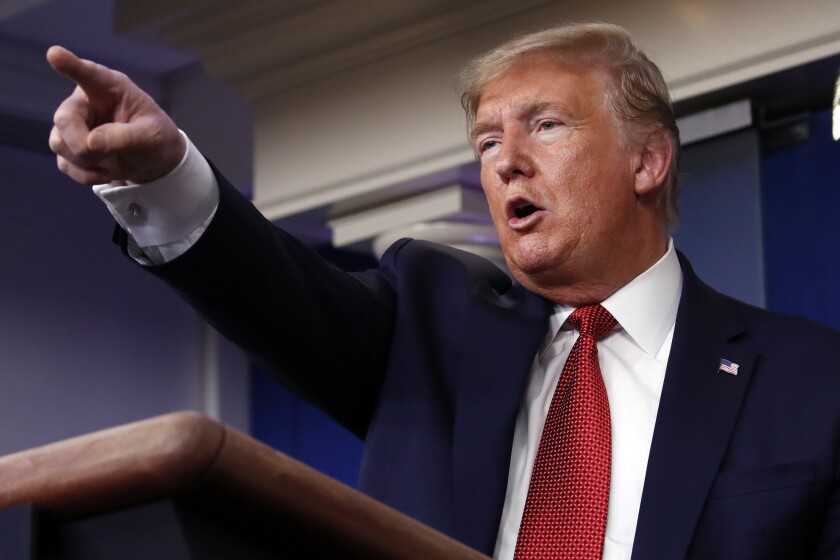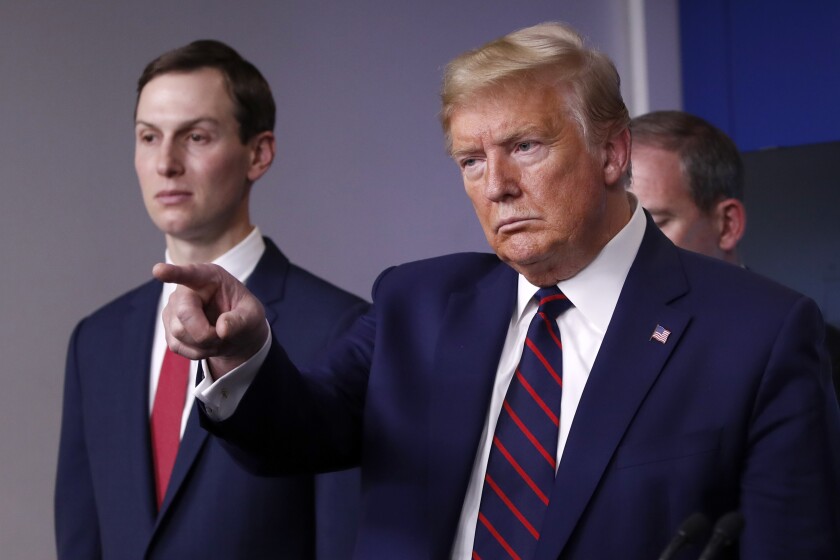Confronted with criticism about the lagging federal response to the coronavirus crisis, President Trump often boasts about his Jan. 31 decision to restrict travel from China, where the outbreak began, claiming he saved thousands of American lives.
But Trump has repeatedly overstated the effect of his decision, and the supposed opposition to it, even as he has misrepresented federal efforts to develop a vaccine and supply protective masks, ventilators and other critically needed gear.
“Nobody wanted that to happen,” he said Wednesday about the China travel ban. “Everybody thought it was just unnecessary to do it. And if we didn’t do that, thousands and thousands of people would have died, more than what’s happened.”
Speaking at a White House coronavirus briefing, Trump gave himself and his administration unabashed praise. “It’s hard not to be happy with the job we’re doing, that I can tell you,” he said.
With more than 68,000 confirmed cases and more than 1,000 U.S. deaths as of Thursday, Trump’s decision two months ago to restrict all foreign travelers from China, and to quarantine Americans returning from China for two weeks, had a short-lived impact at best, experts say.
“To the degree that it bought us time, we did not take advantage of that time,” said Jeffrey Levi, a public health expert at George Washington University, who said the coronavirus had already spread to other countries when Trump imposed the ban.
Levi said the administration should have begun widespread testing, improved medical surveillance systems, begun preparing hospitals and ordered emergency production of masks and ventilators “so we wouldn’t be in the difficult position we’re in today.”
Chris Beyrer, a professor of epidemiology and international health at Johns Hopkins University, said Trump issued his order too late to make a difference because coronavirus infections were already reported in San Francisco, Los Angeles, Chicago, New York and Toronto, as well as 26 other countries.
Any gains from the travel ban were lost in “the crucial early days and weeks of spread by our lack of testing, limited contact tracing, and failure to impose rapid travel and movement restrictions where cases were identified to limit clusters,” he said.
Dr. Anthony Fauci, the director of the National Institute of Allergy and Infectious Diseases and the public face of the administration’s public health response, has praised Trump’s decision on China but said it wasn’t enough to halt “the tsunami” of infections.
With its caseload fast rising, the United States will soon be the epicenter of the global pandemic, according to Ashish Jha, director of the Harvard Global Health Institute.
“We squandered weeks,” Jha said Thursday. The travel restrictions “created a sense of complacency because it felt like we did something meaningful.”
Asked Thursday about the fast spread of U.S. infections, Trump acted as if it were a point of pride, calling the soaring figures “a tribute to our testing” while casting doubt on the accuracy of China’s numbers.
“I’m sure you’re not able to tell what China’s testing and not testing,” he said.
China, which appears to have gotten its own outbreak under control, tightened its own travel restrictions Thursday. Beijing announced that it would temporarily block foreign nationals with valid visas and residence permits from entering the country.
Trump said he planned to speak by phone with Chinese President Xi Jinping on Thursday night.
As the crisis has worsened, Trump has repeatedly blamed what he calls “the Chinese virus,” although this week he briefly stopped amid reports of racist attacks on Asian Americans. He revived the term Thursday, however.
“I talk about the ‘Chinese virus’ and I mean it — that’s where it came from,” he said at the White House briefing, before praising Asian Americans. “I’m very close to them, as you know,” Trump said.
The president and some of his supporters continue to suggest China was responsible for the pandemic, which began in Wuhan, and some members of the administration have called it the “Wuhan virus.”
A video meeting of the Group of Seven nations ended Wednesday without a customary joint statement because other foreign ministers wouldn’t agree with a demand by Secretary of State Michael R. Pompeo, who chaired the meeting, to cite the Wuhan virus, not the coronavirus.
Tim O’Brien, a Trump biographer, said the president is “trying to self-preserve by shifting blame for the problem to China and he’s trying to portray himself as a man of action by focusing on this one thing he did,” referring to the travel ban.
“He’s much more concerned about self-preservation and self-aggrandizement than he is about doing the right thing as a leader in a time of crisis,” said O’Brien, who worked as an advisor to Michael R. Bloomberg’s now-shuttered campaign for the Democratic presidential nomination.
Trump repeatedly minimized the danger of the pandemic until March 13, when he declared a national emergency — “two very big words” — to free up $50 billion in federal resources to deal with the crisis even as he denied any responsibility for the slow response.
He has falsely claimed that testing, a key to identifying and containing the spreading virus, was widely available when it was not, shifting only this week to boasts about tests having finally ramped up.
He has also touted unproven remedies and falsely suggested a vaccine is imminent.
Trump has also overstated Democrats’ response to the travel ban, accusing Senate Minority Leader Charles E. Schumer (D-N.Y.) and Joe Biden, the putative Democratic presidential nominee, of opposing it. Neither one did so, although Biden blasted Trump more broadly for what he called a record of “xenophobia and hysteria.”
Washington is justified in criticizing Beijing for covering up the early stages of the outbreak by concealing reports of the virus and detaining doctors who sounded early alarms, according to China experts. But the mounting propaganda battle threatens to hamper cooperation at a critical moment.
“We should be cooperating at a time when China has learned a lot about this virus, and instead we’re engaging in this name-calling,” said Stephen A. Orlins, president of the National Committee on U.S.-China Relations, a nongovernmental group.
“The nationalism it’s stoked in China is terrible,” he added. “There are people in China who want to send masks and equipment to the rest of the world, but they’d rather send it to the [European Union] than the U.S. at this point.”
“Every effort that the administration should be making today should be focused on saving American lives. That the administration is seeking to talk about blame at this point is a political calculus that is incredibly irresponsible and inappropriate to the moment.”









